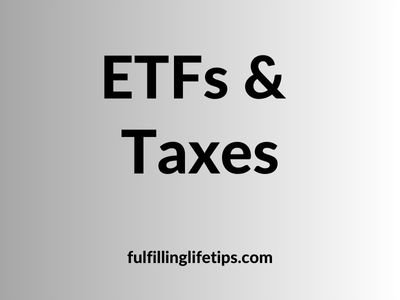Exchange-traded funds (ETFs) are a popular investment vehicle due to their low costs and diversification. However, before investing in ETFs, it’s important to understand the tax implications of owning them. In this article, we’ll explore the tax considerations you need to know before investing in ETFs. What exactly is the relationship between ETFs and taxes?

Understanding ETFs
Before we dive into the tax implications of owning ETFs, let’s first define what ETFs are.
ETFs are investment funds that hold a basket of securities, such as stocks or bonds and are traded on a stock exchange. They offer investors a low-cost way to diversify their portfolios and are bought and sold throughout the day, just like individual stocks.
ETFs and Taxes
Taxes on ETFs are handled by the Internal Revenue Service (IRS) in the United States. The IRS provides guidelines and regulations for the taxation of investments, including ETFs. As an investor, it’s important to understand the tax implications of owning ETFs and to consult with a financial advisor or tax professional for guidance on how to minimize your tax liability.
One of the advantages of investing in ETFs is their tax efficiency. ETFs are structured in a way that can potentially reduce the amount of taxes you owe on your investments. Here are some key tax considerations to keep in mind:
- Capital Gains: When you sell an ETF for a profit, you’ll be subject to capital gains taxes. ETFs are typically more tax-efficient than mutual funds because of their structure. Mutual funds are required to distribute capital gains to shareholders at the end of each year, which can trigger tax liabilities for investors. ETFs, on the other hand, can potentially avoid these capital gains distributions by using a unique redemption process.
- Dividends: Like any other investment, ETFs may pay out dividends to their shareholders. These dividends are typically taxed at your regular income tax rate. However, some ETFs, such as those that track municipal bonds, may offer tax-free dividends.
- Holding Period: The length of time you hold an ETF can impact the amount of taxes you owe. If you hold an ETF for more than a year before selling it, you’ll be subject to long-term capital gains taxes, which are typically lower than short-term capital gains taxes.
- Rebalancing: If you rebalance your portfolio by selling one ETF and buying another, you’ll be subject to capital gains taxes on the ETF you sold. However, if you’re rebalancing within a tax-advantaged account, such as an IRA, you won’t owe any taxes on the transaction.
- Taxes on ETF Expenses: Like any investment, ETFs have fees and expenses that can impact your returns. These fees can include expense ratios, brokerage fees, and trading costs. However, unlike mutual funds, ETFs don’t typically have any sales charges or redemption fees.
Additionally, ETFs can be more tax-efficient than mutual funds because they tend to have lower expense ratios, which means less of your investment returns are lost to fees.
Tips for Minimizing Taxes on ETFs
Now that you understand the tax implications of owning ETFs, here are some tips for minimizing your tax liability:
- Consider Holding ETFs in a Tax-Advantaged Account: Holding your ETFs in a tax-advantaged account, such as an IRA or 401(k), can potentially reduce your tax liability. This is because any capital gains or dividends earned within the account are tax-deferred or tax-free until you withdraw the funds.
- Choose Tax-Efficient ETFs: Some ETFs are more tax-efficient than others. For example, ETFs that track indexes with low turnover rates may be more tax-efficient than those with high turnover rates. Additionally, ETFs that track municipal bonds may offer tax-free dividends.
- Avoid Frequent Trading: Frequent trading of ETFs can result in higher taxes, as each trade triggers a potential tax liability. Consider a buy-and-hold strategy to minimize your tax liability.
- Tax-Loss Harvesting: If you have ETFs that have lost value, you may be able to offset capital gains on other investments by selling the losing ETFs. This is known as tax-loss harvesting and can potentially reduce your overall tax liability.
Conclusion to ETFs and Taxes
ETFs are a popular investment vehicle due to their low costs and diversification. However, it’s important to understand the tax implications of owning ETFs before investing.
By choosing tax-efficient ETFs, holding them in tax-advantaged accounts, and avoiding frequent trading, you can potentially minimize your tax liability and maximize your investment returns. Always consult with a financial advisor or tax professional before making any investment decisions.




Id like to thank you for the efforts you have put in penning this site. Im hoping to see the same high-grade blog posts by you in the future as well. In fact, your creative writing abilities has inspired me to get my own site now 😉
Excuse, that I interfere, but you could not paint little bit more in detail.